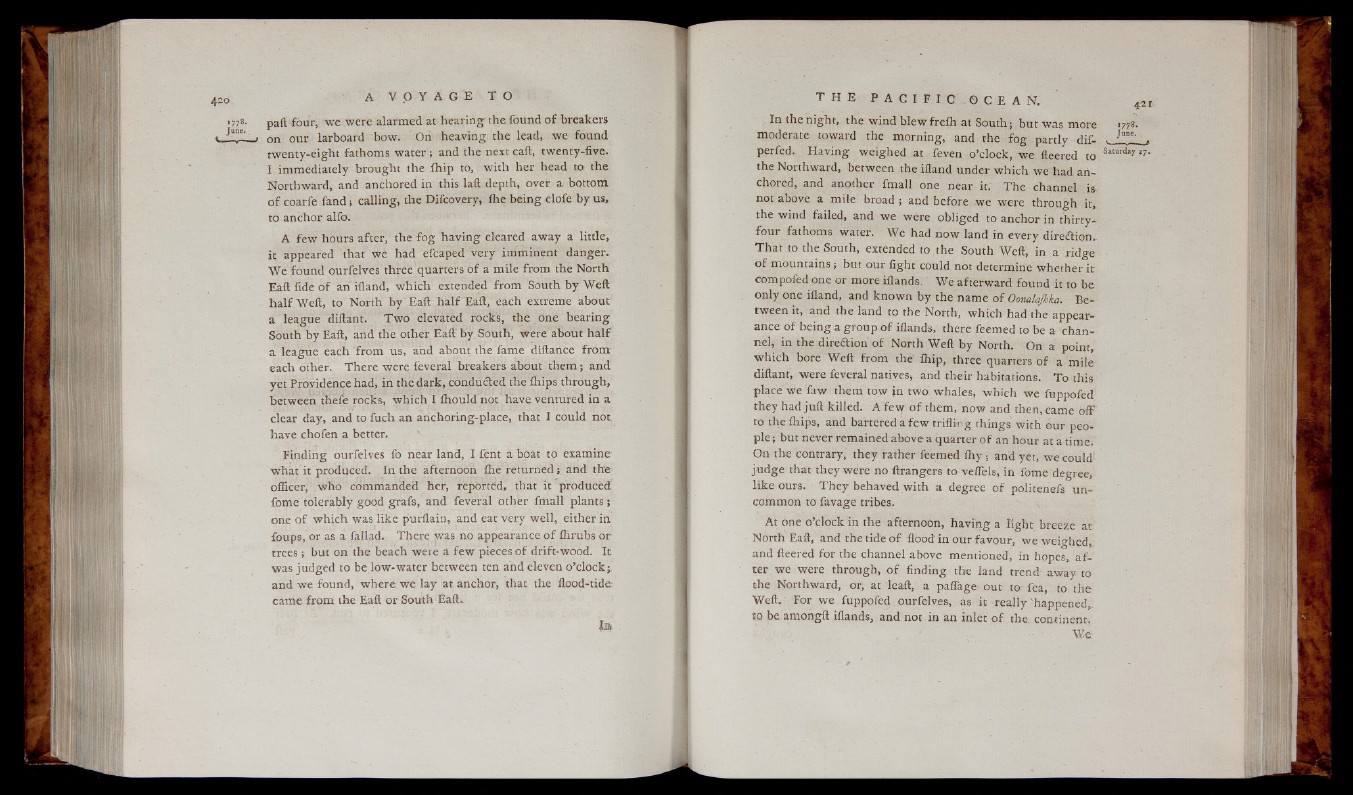
1778. paft four, we were alarmed at hearing the found o f breakers
. J“"l' . on our. larboard bow. On heaving the lead, we found
twenty-eight fathoms water ; and the next call, twenty-five.
I immediately brought the ihip to, with her head to the
Northward, and anchored in this laft depth, over a bottom
o f coarfe fan d ; calling, the Difcovery, fhe being clofe by us,
to anchor alfo.
A few hours after, the fo g h a vin g cleared awa y a little,
it appeared that we had efcaped ve ry imminent danger.
We found ourfelves three quarters o f a mile from the North
Eaft fide o f an ifland, w h ich extended from South by Weft
h a lf Weft, to North by Eaft h a lf Eaft, each excreme about
a league diftant. Tw o elevated rocks, the one bearing
South b y Eaft, and the other Eaft by. South, were about h a lf
a leagu e each from us, and about the fame diftance from
each other. T he re were feveral breakers about th em ; and
yet Providence had, in the dark, conducted the ihips through,
between thefe rocks, w hich I ihould not have ventured in a
clear day, and to fuch an arichoring-place, that I could n o t
have chofen a better.
Finding ourfelves fo near land, I lent a boat to examine
what it produced. In the afternoon fhe returned j and the
officer, who commanded her, reported, that it produced
fome tolerably good grafs, and feveral other fmall p lan ts ;
one o f which was like purflain, and eat very w ell, either in
foups, or as a fallad. There was no appearance o f ffirubs or
tr e e s ; but on the beach were a few pieces o f drift-wood. It
was judged to be low-water between ten and eleven o ’clock;,
and we found, where w e la y at anchor, that the ilood-tide-
came from the Eaft or South Eaft.
In the night, the wind b lew fre ih at South; but was more >778.
moderate toward the morning, and the fo g partly dif- . Junl!'
perfed. Having weighed at feven o’clock, we fleered to
the Northward, between the ifland under w hich we had anchored,
and another fmall one near it. The channel is
not above a mile broad ; and before we were through it,
the wind failed, and we were obliged to anchor in thirty-
fou r fathoms water. We had now land in every direftion..
T h a t to the South, extended to the South Weft, in a ,ridge
o f mountains; but our fight could not determine whether it
compofed one or more iflands. We afterward found it to be
only one ifland, and known by the name o f Oonalajhka. Between
it, and the land to the North, which had the appearance
o f being a group o f iflands, there feemed to be a channel,
in the diretftion o f North Weft b y North. On a point,
w hich bore Weft from the' ihip, three quarters o f a mile
diftant, were feveral natives, and their habitations. To this
place we faw them tow in two whales, which we fuppofed
they had juft killed. A fe\y o f them, now and then, came oft?
to the ihips, and bartered a few trifling things with our people
; but never remained above a quarter o f an hour at a time.
On the contrary, they rather feemed ih y ; and yet, we could
ju d g e that they w ere no flrangers to veflels, in fome degree,
lik e ours. T h e y behaved with a degree o f politenefs un common
to favage tribes.
At one o’clock in the afternoon, h a v in g a ligh t breeze at
North Eaft, and the tide o f flood in our favour, we weighed,
and fleered for the channel above mentioned, in hopes, a f ter
we were through, o f finding the land trend away to
the Northward, or, at leaft, a paflage out to fea, to the
Weft. For we fuppofed ourfelves, as it really'happened*,
to be amongft iflands, and not in an inlet o f the continent.
W e